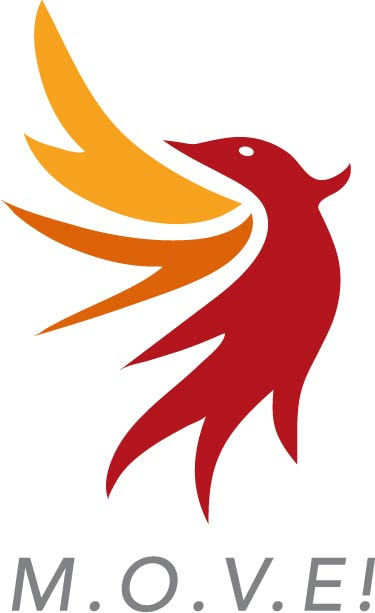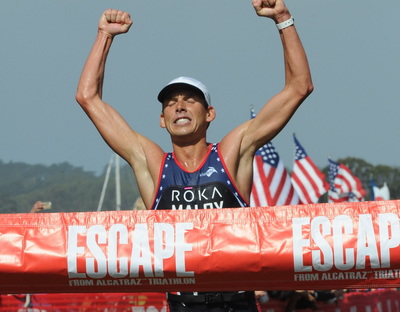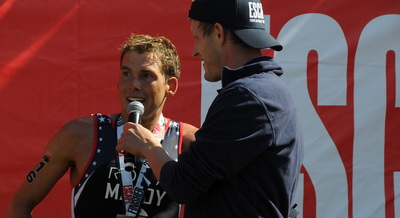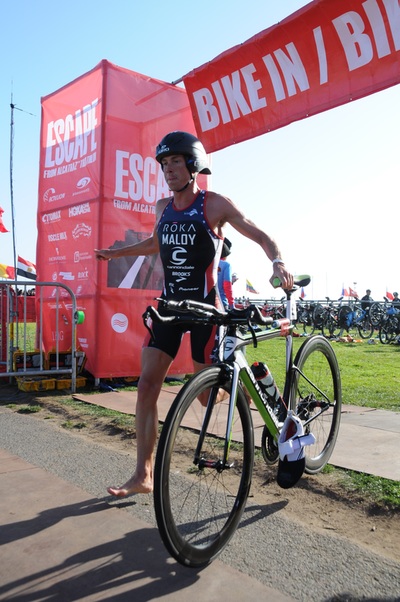Olympic Triathlete Joe Maloy
"Success--in anything--is about taking action." Olympic Triathete Joe Maloy
C.U.: Joe Maloy, a member of the U.S. Olympic Triathlon Team who will be competing at 10:00 a.m. EST on August 18th, practices MOVE! concepts and contributed to the book. He was my student in “Elements of Competitive Performance” at Boston College eight years ago. Then and now Joe has said that the MOVE! method of goal achievement is not just for women. Sometime, Joe, I’d like to hear you say more about that…..:)
Joe: Anytime :)
C.U.: Joe, we are thrilled that you have achieved your dream of competing in the Olympics. Here are a few questions below. Feel free to add your own and thank you so much for taking the time to be with us on the website!
….You were the captain of the swim team in college, graduating eight years ago. What was your biking and running history?
Joe: My biking and running history is really an off-shot of my swimming background. I grew up on the Jersey Shore, and swimming was always my primary sport. I originally ran for cross training, and after some preliminary successes, competitively on my high school cross country and track teams.
During my time at Boston College, I started biking in spinning classes--with no intentions beyond getting a good workout. When I decided to compete in my first triathlon after graduating in 2008, the bike fitness from those classes came in handy!
C.U.: Can you divide up the last eight years in terms of a progression to the Olympics….I.e. did you decide to try for the Olympics as soon as you finished college?
Joe: Like anything worthwhile, my progression to the Olympics was a process. I started competing in triathlons as a competitive outlet because I missed racing for the Boston College Swim Team and the Wildwood Crest Beach Patrol.
The process has always been about getting the most out of myself--seeing what’s possible. As I enjoyed the sport more, I invested more time and energy into the pursuit. That invested time and energy returned better results. Racing in the Olympics isn’t an end, but rather a continuation of that process.
C.U.: There are many challenging aspects of the Olympic triathlon journey. What would you say they are and can you give examples?
Joe: Many people think the hardest part of the Olympic triathlon journey is the training, but that’s missing the point. Workouts are a chance to get better, and that’s the part I’ve always loved.
The most challenging aspects of the journey have been when I’ve needed to make choices that seemingly ran counter to my core values. I believe in helping others and in investing in my family and friends. It wasn’t easy to forgo stable employment, move 3,000 miles from home to live in a full-time training environment, or spend the majority of my 20s going to bed at 9:30pm every weekend night!
Delayed gratification, a topic we discussed in Elements of Competitive Performance, comes to mind when reflecting on these examples. While striving towards any big goal, the path is not easy. It comes down to investing in yourself and trusting the process will make you a stronger athlete, a better friend, and more suited to compete in the world--athletically and otherwise.
C.U.: If you haven’t mentioned training yet, can you give a summary of a week of peak training (hours of swimming, biking, and running, or number of workouts in a week, or speed/distance covered)? It’s still a 1,500 meter swim, a 40km cycle, and a 10km run, right?
Joe: Yep, the standard Olympic triathlon distances are a 1,500m swim, 40K Bike, and a 10K run. Unlike events like swimming or track where the courses regulated, the triathlon takes place under “real world” conditions. Our race plays out over the prescribed distances, but happens in local waters and roads that are unique to each venue.
My days and weeks of training are actually pretty repetitive...I train 3 times per day--except for Sunday, when I generally take the afternoon off. A typical training week amounts to 6 swim, 5-6 bikes, and 8-9 runs--25-30hours of total training.
C.U.: In an interview with Triathlon Magazine, you stated that taking risks was essential. You said something like “I knew I had to take a risk and do something drastic.” What was the risk for you and what have you learned about taking risks?
Joe: I’ll stand by that quote! The risk, for me, was to bet on myself. I believed in my potential to become a world class triathlete, but belief and potential only take you so far. Success--in anything--is about taking action. When you take action, you are deciding for something and against something else.
I think “risk” is really just an emotionally charged choice. Sometimes these choices work out the way we expect them to, and sometimes they don’t. In both cases, the result opens you to a world of new opportunities that didn’t exist before you took the initial action. I believe the process of making these emotionally charged choices prepares you to handle similar future situations. Through these choices, or risks, we create our own reality instead of accepting one that is handed to us. I'm not sure about you, but I’d always rather be an actor than a participant.
C.U.: This website, your quest, and my course are about setting and achieving goals – and all related to that. You are clearly an expert. Do have a thought to share about goals? If you want to share your goal for the Olympics, what is it (or can I guess)?
Joe: You can probably guess my answers to both of these questions!
I’d of course encourage anyone reading this interview to set goals. They don’t need to be big ones, but they need to be viewed as things to strive towards and focus your efforts. It’s good to take actions that link effort to results, and setting goals is a great way to focus your actions in a targeted direction.
That being said, of course I have a goal for the Olympics! It’s to be fully present and to enjoy the experience. I’m preparing and will compete in a way that positively reflects on myself, my country, my family, and my friends. This means training with integrity, trusting in my support network, enjoying the company of my family, friends, teammates, and coaches, and executing the tasks I practice everyday. I could go into more detail, but I like talking and am afraid I’d get carried away :)
C.U.: Finally, can we speak with you after the Olympics are over for a post goal analysis?
Joe: Even though I’ll be very famous, I can always make time for my Boston College mentor!
C.U.: Joe Maloy, a member of the U.S. Olympic Triathlon Team who will be competing at 10:00 a.m. EST on August 18th, practices MOVE! concepts and contributed to the book. He was my student in “Elements of Competitive Performance” at Boston College eight years ago. Then and now Joe has said that the MOVE! method of goal achievement is not just for women. Sometime, Joe, I’d like to hear you say more about that…..:)
Joe: Anytime :)
C.U.: Joe, we are thrilled that you have achieved your dream of competing in the Olympics. Here are a few questions below. Feel free to add your own and thank you so much for taking the time to be with us on the website!
….You were the captain of the swim team in college, graduating eight years ago. What was your biking and running history?
Joe: My biking and running history is really an off-shot of my swimming background. I grew up on the Jersey Shore, and swimming was always my primary sport. I originally ran for cross training, and after some preliminary successes, competitively on my high school cross country and track teams.
During my time at Boston College, I started biking in spinning classes--with no intentions beyond getting a good workout. When I decided to compete in my first triathlon after graduating in 2008, the bike fitness from those classes came in handy!
C.U.: Can you divide up the last eight years in terms of a progression to the Olympics….I.e. did you decide to try for the Olympics as soon as you finished college?
Joe: Like anything worthwhile, my progression to the Olympics was a process. I started competing in triathlons as a competitive outlet because I missed racing for the Boston College Swim Team and the Wildwood Crest Beach Patrol.
The process has always been about getting the most out of myself--seeing what’s possible. As I enjoyed the sport more, I invested more time and energy into the pursuit. That invested time and energy returned better results. Racing in the Olympics isn’t an end, but rather a continuation of that process.
C.U.: There are many challenging aspects of the Olympic triathlon journey. What would you say they are and can you give examples?
Joe: Many people think the hardest part of the Olympic triathlon journey is the training, but that’s missing the point. Workouts are a chance to get better, and that’s the part I’ve always loved.
The most challenging aspects of the journey have been when I’ve needed to make choices that seemingly ran counter to my core values. I believe in helping others and in investing in my family and friends. It wasn’t easy to forgo stable employment, move 3,000 miles from home to live in a full-time training environment, or spend the majority of my 20s going to bed at 9:30pm every weekend night!
Delayed gratification, a topic we discussed in Elements of Competitive Performance, comes to mind when reflecting on these examples. While striving towards any big goal, the path is not easy. It comes down to investing in yourself and trusting the process will make you a stronger athlete, a better friend, and more suited to compete in the world--athletically and otherwise.
C.U.: If you haven’t mentioned training yet, can you give a summary of a week of peak training (hours of swimming, biking, and running, or number of workouts in a week, or speed/distance covered)? It’s still a 1,500 meter swim, a 40km cycle, and a 10km run, right?
Joe: Yep, the standard Olympic triathlon distances are a 1,500m swim, 40K Bike, and a 10K run. Unlike events like swimming or track where the courses regulated, the triathlon takes place under “real world” conditions. Our race plays out over the prescribed distances, but happens in local waters and roads that are unique to each venue.
My days and weeks of training are actually pretty repetitive...I train 3 times per day--except for Sunday, when I generally take the afternoon off. A typical training week amounts to 6 swim, 5-6 bikes, and 8-9 runs--25-30hours of total training.
C.U.: In an interview with Triathlon Magazine, you stated that taking risks was essential. You said something like “I knew I had to take a risk and do something drastic.” What was the risk for you and what have you learned about taking risks?
Joe: I’ll stand by that quote! The risk, for me, was to bet on myself. I believed in my potential to become a world class triathlete, but belief and potential only take you so far. Success--in anything--is about taking action. When you take action, you are deciding for something and against something else.
I think “risk” is really just an emotionally charged choice. Sometimes these choices work out the way we expect them to, and sometimes they don’t. In both cases, the result opens you to a world of new opportunities that didn’t exist before you took the initial action. I believe the process of making these emotionally charged choices prepares you to handle similar future situations. Through these choices, or risks, we create our own reality instead of accepting one that is handed to us. I'm not sure about you, but I’d always rather be an actor than a participant.
C.U.: This website, your quest, and my course are about setting and achieving goals – and all related to that. You are clearly an expert. Do have a thought to share about goals? If you want to share your goal for the Olympics, what is it (or can I guess)?
Joe: You can probably guess my answers to both of these questions!
I’d of course encourage anyone reading this interview to set goals. They don’t need to be big ones, but they need to be viewed as things to strive towards and focus your efforts. It’s good to take actions that link effort to results, and setting goals is a great way to focus your actions in a targeted direction.
That being said, of course I have a goal for the Olympics! It’s to be fully present and to enjoy the experience. I’m preparing and will compete in a way that positively reflects on myself, my country, my family, and my friends. This means training with integrity, trusting in my support network, enjoying the company of my family, friends, teammates, and coaches, and executing the tasks I practice everyday. I could go into more detail, but I like talking and am afraid I’d get carried away :)
C.U.: Finally, can we speak with you after the Olympics are over for a post goal analysis?
Joe: Even though I’ll be very famous, I can always make time for my Boston College mentor!



